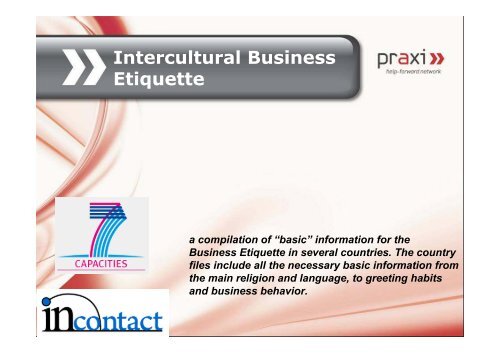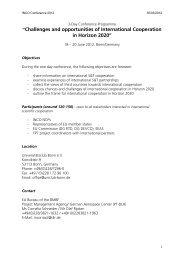Intercultural Business Etiquette
Intercultural Business Etiquette
Intercultural Business Etiquette
Create successful ePaper yourself
Turn your PDF publications into a flip-book with our unique Google optimized e-Paper software.
<strong>Intercultural</strong> <strong>Business</strong><br />
<strong>Etiquette</strong><br />
a compilation of “basic” information for the<br />
<strong>Business</strong> <strong>Etiquette</strong> in several countries. The country<br />
files include all the necessary basic information from<br />
the main religion and language, to greeting habits<br />
and business behavior.
Armenia
Armenia<br />
Greetings, titles, business cards<br />
• Men and women greet each other with a handshake.<br />
• Women should wait for a man to present his hand for a<br />
handshake.<br />
• “Barev” or “Barev dzez” means “Hello”<br />
• It is common to address people by their first names<br />
followed by a title such as “Parin” for Mr., “Bjishk” for<br />
Dr., “Tikin” for Mrs., and “Oriord” for Miss.<br />
Gift giving<br />
• Gifts are expected.<br />
• Personal gifts are inappropriate- office gifts are best.<br />
• Gifts should be wrapped.<br />
• When receiving a gift you should not open it in public.
Armenia<br />
Communication style<br />
• People tend to be very direct and say exactly what they<br />
want to say. There is usually no holding back on what<br />
one says. A visitor must not take this to heart.<br />
• In business interactions, an arm’s length of space is<br />
acceptable.<br />
• There is no touching during conversation.<br />
• Direct eye contact is preferred.<br />
Gestures<br />
• Beckon someone by raising a hand, or stop someone<br />
with a side wave (like shooing away a cat).<br />
• Do not make a fist with the thumb between the index<br />
and middle finger as it is obscene.
Armenia<br />
<strong>Business</strong> behavior<br />
• For the most part, things start within a 15-20 after the<br />
designated time. However, if one is attending an Armenian<br />
event, “just five more minutes” may end up being hours.<br />
• One should engage through listening and speaking.<br />
• Small talk is expected, but allow the Armenian to start and<br />
end it.<br />
Negotiations<br />
• <strong>Business</strong> is business, but Armenians tend to be very<br />
friendly and communicative so it is best that you create a<br />
friendly atmosphere during your business meeting, make<br />
proper jokes and so on.<br />
• It is best to not show overly strong emotions during<br />
negotiations and to expect the decisions not to be made<br />
right away.
Azerbaijan
Azerbaijan<br />
Greetings, titles, business cards<br />
• Men shake hands when greeting and maintain direct eye<br />
contact. Women shake hands or exchange a nod.<br />
• A man should allow a woman to offer her hand before shaking it.<br />
• It is frowned upon for religious men to touch women & vice versa.<br />
• It is common to address people by their first names followed by<br />
title. The title of “muellim/a” is given for anyone with a degree.<br />
• Always give and receive business cards with your right hand.<br />
Gift giving<br />
• Gifts are not usually brought to a first business meeting.<br />
• Gifts should be offered three times; it is proper to refuse a gift<br />
twice and accept on the third offering.<br />
• It is appropriate to bring fruit, pastries and/or flowers to an Azeri<br />
home. Always give an odd number of flowers; even numbers are<br />
reserved for funerals. Avoid bringing alcohol.<br />
• It is best to wrap gifts nicely.<br />
• Gifts are not opened when received.
Azerbaijan<br />
Communication style<br />
• Azeris tend to be direct and often use the command form.<br />
• An arm’s length of space is common during conversation.<br />
• There is a fair amount of touching between members of the<br />
same sex, but there is no touching between men and women.<br />
• Always maintain eye contact while speaking, since Azeris take<br />
this as a sign of sincerity. If someone does not look them in the<br />
eye while speaking, they think he has something to hide.<br />
Gestures<br />
• Do not point with one finger, but with the whole hand.<br />
• Do not put your thumb and index finger together to make a<br />
circle (like the “ok” sign) as it is obscene.<br />
• Do not slap the palm of one hand on a closed fist; it is obscene.<br />
• Do not put your thumb between your index and middle finger in<br />
a fist, as it is obscene.<br />
• Do not show the sole of your foot is considered rude.<br />
• A hand held palm up and shaken back and forth asks (any)<br />
question.<br />
• Take your shoes off before entering mosques and homes.<br />
• Give and receive things with your right hand.
Azerbaijan<br />
<strong>Business</strong> behavior<br />
• To arrange a meeting, an introductory letter is needed outlining<br />
your company, history and the purpose of your visit. It is a good<br />
idea to have it translated to Azeri.<br />
• Azeris are sensitive to status, title, who sits down first, who<br />
enters the room first, etc. Follow the lead.<br />
• Be on time for meetings, even though you may be kept waiting.<br />
• Discussions begin with small talk to establish a relationship, then<br />
the host begins the business discussion. Appropriate topics:<br />
family, sports, food, and places of interest. Avoid: politics, drugs,<br />
sex, and religion.<br />
• Meetings can go on for longer than scheduled. Be patient.<br />
• If you are offered tea, accept it.<br />
Negotiations<br />
• Decisions tend to be reached from the top down and take a<br />
while. Be prepared to have several meetings to reach a final<br />
decision. It is best not to appear impatient.<br />
• Bargaining and haggling take on a large role in negotiations.
Belarus
Belarus<br />
Greetings, titles, business cards<br />
• Men greet each other with a handshake and direct eye<br />
contact.<br />
• Women exchange a light handshake or nod.<br />
• Men and women usually do not touch.<br />
• When meeting for the first time, or to someone to<br />
whom it is necessary to show respect, you say<br />
“Zdrastvuichi”.<br />
• There is no specific protocol surrounding the giving and<br />
receiving of business cards.<br />
Gift giving<br />
• Gifts usually mean corruption so it is best to avoid any<br />
gifts at initial meetings.
Belarus<br />
Communication style<br />
• Belarusians tend to say what they mean and what they<br />
are thinking, but never directly to the person they are<br />
thinking about.<br />
• Touching during conversations is not common.<br />
• Direct eye contact while speaking is common.<br />
Gestures<br />
• Belarusians point to things with one finger.
Belarus<br />
<strong>Business</strong> behavior<br />
• On time means on time. However, inconveniences<br />
happen and mishaps are understood. These<br />
inconveniences are expected to be understood without<br />
explanation or apology.<br />
Negotiations<br />
• <strong>Business</strong> meetings tend to be quite structured. The<br />
leader speaks and runs the meeting. The plan is<br />
presented for the meeting and it is usually followed to<br />
the last line and then the meeting is adjourned.<br />
• Avoid hard selling tactics and any sort of conflict or<br />
confrontation.<br />
• Important decisions can take a while but simple<br />
decisions are made on the spot.
China
China<br />
Greetings, titles, business cards<br />
• Handshake when greeting and departing, sometimes<br />
accompanied by a nod of the head.<br />
• Titles are very important and it is best to address<br />
people directly by using their professional title, or Mr.,<br />
Mrs., or Miss.<br />
• It is a good idea to translate one side of your business<br />
card into Chinese.<br />
• Present your business card with both hands, with the<br />
Chinese side facing the recipient.<br />
• When receiving business cards, examine them carefully<br />
to show interest. Never write on or fold a business card<br />
you are given.<br />
• Never put a card in your wallet or pocket. Carry a small<br />
card case.
China<br />
Gift giving<br />
• Gifts are not usually exchanged at a first meeting.<br />
• Quality writing pens are considered favored gifts.<br />
• Do not give: knives, scissors, letter openers, clocks,<br />
straw sandals, a stork or crane, handkerchiefs, anything<br />
white, blue or black, and anything in groups of four<br />
• Gifts should always be nicely wrapped.<br />
• Gifts are not to be opened right away unless prompted<br />
to do so.<br />
• Receive and give gifts with two hands. It is polite to<br />
refuse a gift several times before accepting.
China<br />
Communication style<br />
• Most Chinese speak in an indirect manner. There is usually<br />
deeper meaning in their words and sometimes what they<br />
mean is quite opposite to what they say.<br />
• Chinese tend to stand a little less than arm’s length from<br />
one another.<br />
• Chinese favor direct eye contact.<br />
Gestures<br />
• Do not beckon with the forefinger, but extend an arm and<br />
make a scratching motion with the fingers.<br />
• Do not point using the index finger, but use an open palm.<br />
• Do not use your feet to move something or put your feet<br />
on furniture.<br />
• Do not whistle or snap your fingers at anyone.<br />
• Do not use large hand movements. The Chinese do not<br />
speak with their hands and your movements may be<br />
distracting to your host.<br />
• Do not stick your chopsticks upright in a bowl of rice as it is<br />
reserved for funerals. Avoid sucking and biting your<br />
chopsticks as well.
China<br />
Gestures cont’d<br />
• Do not put your hand in your mouth.<br />
• Avoid personal contact at all costs. It is highly<br />
inappropriate for a man to touch a woman in public. Do<br />
not drop the chopsticks it is considered bad luck.<br />
• Do not rub your chopsticks together before dining. It<br />
implies that you have been given poor quality<br />
chopsticks that may have splinters.<br />
• Never place your chopsticks straight up in your bowl. By<br />
placing your sticks upright in your bowl your will remind<br />
your host of joss sticks which connotes death.<br />
• Do not blow your nose at the table or in public.<br />
• Do not refuse to drink. Even if you do not drink, accept<br />
it.<br />
• Women should not shake legs while sitting, snap<br />
fingers, or whistle.<br />
• It is common in China to show one's surprise or dismay<br />
by sucking air in quickly and loudly through the lips and<br />
teeth.<br />
• Spitting in public is very common.
China<br />
<strong>Business</strong> behavior<br />
• It is rude to be late in business situations, but a boss,<br />
or one with a higher social or political status, may be<br />
late as a show of how busy they are.<br />
• Appointments are a must for business.<br />
• Contacts should be made prior to your trip.<br />
• Bring several copies of all written documents for your<br />
meetings.<br />
• <strong>Business</strong> discussions begin with small talk, then the<br />
host begins the business discussion.<br />
• The most important member of your company should<br />
lead important meetings. Chinese value rank and<br />
status.<br />
• Allow the Chinese to leave a meeting first.
China<br />
Negotiations<br />
• Chinese value relationship building and harmony so<br />
avoid hard selling, pressure tactics and any sort of<br />
conflict or confrontation.<br />
• Decisions are made by the head of the group and can<br />
take a long time to be reached.<br />
• Chinese use an indirect communication style and will<br />
avoid using “no.”<br />
• Many Chinese will want to consult with the stars or wait<br />
for a lucky day before they make a decision.
China<br />
Other<br />
• As a cultural courtesy, you should taste all the dishes<br />
you are offered.<br />
• Do not eat all of your meal. If you eat all of your meal,<br />
the Chinese will assume you did not receive enough<br />
food and are still hungry.<br />
• Do not discuss business at meals.<br />
• Do not start to eat or drink prior to the host.
Costa Rica
Costa Rica<br />
Greetings, titles, business cards<br />
• Men and women shake hands when greeting and maintain<br />
direct eye contact.<br />
• Titles are important. You may speak directly to someone by<br />
using only his or her title, without including the last name.<br />
– A Ph.D. or a physician = Doctor (dok-TOR)<br />
– Teacher = Profesor (pro-fe-SOR)<br />
– Lawyer = Abogado/a (a-bo-GA-do/da)<br />
• Persons who do not have professional titles should be<br />
addressed as:<br />
– Mr. = Señor (sen-YOR)<br />
– Mrs. = Señora (sen-YOR-a)<br />
– Miss = Señorita (sen-yor-I-ta)<br />
• Most Latinos have two surnames: one from their father, which<br />
is listed first, followed by one from their mother. Only the<br />
father’s surname is used when addressing someone<br />
• There is no specific ritual surrounding the giving of business<br />
cards. Treat the card with respect and interest.<br />
• It is advisable to have one side of your business card<br />
translated into Spanish. Present your business card with the<br />
Spanish side facing the recipient.
Costa Rica<br />
Gift giving<br />
• Gifts are usually not brought to a first meeting.<br />
• If invited to a home, it is appropriate to bring flowers<br />
(avoid lilies), wine, spirits, or chocolates.<br />
• Gifts should be nicely wrapped.<br />
• Gifts are usually opened right away.<br />
Communication style<br />
• Costa Ricans tend to take a more indirect path when<br />
communicating, requiring creative speaking and<br />
listening techniques.<br />
• Costa Ricans stand close to one another while talking.<br />
• There is a fair amount of touching while conversing.<br />
• Direct eye contact is necessary if you want to deliver a<br />
consistent message.
Costa Rica<br />
Gestures<br />
• To point, using one finger is normal.<br />
• A common gesture is to clap one hand with the backside<br />
of the other hand and then drag that second hand<br />
down. It means “let’s leave or “let’s go”.<br />
• Do not make a fist with your thumb between your index<br />
and middle fingers.<br />
• Do not put your feet on furniture.<br />
• Being drunk in public is impolite and can make people<br />
think you are not a trustworthy person.
Costa Rica<br />
<strong>Business</strong> behavior<br />
• Arriving on time is important. Costa Ricans are quite<br />
punctual.<br />
• There is usually some form of small talk before discussing<br />
business. Appropriate topics include: local culture, family,<br />
history, politics, soccer.<br />
• It is best to allow your host to begin the business<br />
discussion.<br />
Negotiations<br />
• Avoid hard selling, pressure tactics and any sort of conflict<br />
or confrontation.<br />
• Costa Ricans use and respond best to indirect<br />
communication style over direct.<br />
• Decisions are usually made through a group consensus and<br />
can be long before they are reached.
El Salvador
El Salvador<br />
Greetings, titles, business cards<br />
• Men and women shake hands when greeting and maintain<br />
direct eye contact.<br />
• Titles are important. You may speak directly to someone by<br />
using only his or her title, without including the last name.<br />
– A Ph.D. or a physician = Doctor (dok-TOR)<br />
– Teacher = Profesor (pro-fe-SOR)<br />
– Lawyer = Abogado/a (a-bo-GA-do/da)<br />
• Persons who do not have professional titles should be<br />
addressed as:<br />
– Mr. = Señor (sen-YOR)<br />
– Mrs. = Señora (sen-YOR-a)<br />
– Miss = Señorita (sen-yor-I-ta)<br />
• Most Latinos have two surnames: one from their father, which<br />
is listed first, followed by one from their mother. Only the<br />
father’s surname is used when addressing someone<br />
• There is no specific ritual surrounding the giving of business<br />
cards. Treat the card with respect and interest.<br />
• It is advisable to have one side of your business card<br />
translated into Spanish. Present your business card with the<br />
Spanish side facing the recipient.
El Salvador<br />
Gift giving<br />
• Gifts are not expected at an initial meeting, but are<br />
appreciated.<br />
• If invited to a Salvadoran home, it is appropriate to<br />
bring flowers, wine, or quality candy.<br />
Communication style<br />
• Indirect communication is very common.<br />
• Most Salvadorans stand a little less than an arm’s<br />
length apart during conversations.<br />
• There is a decent amount of touching during<br />
conversations.<br />
• Direct eye contact is expected and appreciated during<br />
conversations.<br />
• Salvadorans are expressive with both hands and face.
El Salvador<br />
Gestures<br />
• Do not point with one finger. People in El Salvador point<br />
with their lips.<br />
• Do not yawn in public.<br />
• Do not put your feet up on a desk or chair.<br />
• To beckon friends, extend the arm with the palm down<br />
and make a scratching motion with the fingers.<br />
• To show how tall a person is you show the height with<br />
the palm facing to the side. Showing height with the<br />
palm facing down is used for animals and plants.
El Salvador<br />
<strong>Business</strong> behavior<br />
• It is best to show up on time for an initial meeting,<br />
although they will start ½-1 hour late.<br />
• There is usually some form of small talk before discussing<br />
business. It is best to allow your host to begin and end the<br />
business discussion.<br />
• Do not talk about: local politics, religion and the civil war.<br />
Negotiations<br />
• Avoid hard selling, pressure tactics and any sort of conflict<br />
or confrontation.<br />
• Decisions are usually made from the top down and take a<br />
while to be reached.<br />
• Expect several meetings before final decisions are made.
Georgia
Georgia<br />
Greetings, titles, business cards<br />
• A firm handshake is acceptable in most situations, and a<br />
nod of acknowledgment tends to be acceptable as well.<br />
• Men should wait for women to extend their hand first.<br />
• Address people directly by using Mr., “Batano” or Mrs.,<br />
“Qalbatano”, followed by the surname.<br />
• There is no specific protocol surrounding the giving and<br />
receiving of business cards. It is always best to treat the<br />
card with respect.<br />
Gift giving<br />
• Gifts are always well received, though not necessarily<br />
expected. They do not need to be much; i.e. a box of<br />
chocolates is always appreciated.<br />
• If you are invited to someone's house it is always nice to<br />
bring something. Flowers (odd numbers only), chocolate,<br />
wine or spirits are acceptable.<br />
• Gifts are not opened in front of the giver.
Georgia<br />
Communication style<br />
• Most people tend to use indirect speaking.<br />
• Georgians tend to be quite lively talkers. Public displays of<br />
emotion are common.<br />
• Personal questions are very common. Georgians are not shy in<br />
asking how much money you make, whether you want to marry<br />
a Georgian, etc.<br />
• When speaking, people are often an arm's length apart.<br />
• There isn't much touching between business associates.<br />
• Direct eye contact is seen as a sign of respect and<br />
trustworthiness.<br />
Gestures<br />
• Pinching the front of the throat and pulling it toward someone is<br />
a way of soliciting, begging, or saying “please.”<br />
• Beckon someone with your palm downwards and make a<br />
scratching motion with the fingers. Do not beckon someone with<br />
the palm up.<br />
• Do not make a circle with the thumb and forefinger (“OK” sign).
Georgia<br />
<strong>Business</strong> behavior<br />
• Georgians are notoriously unpunctual. Meetings rarely start<br />
on time, and it is not unusual for people to arrive as much<br />
as 45 minutes or an hour later.<br />
• Punctuality is important if one is meeting with VIPs;<br />
otherwise lateness is overlooked.<br />
• It is advisable to shake hands with everyone upon arriving<br />
and leaving. The person of higher status usually initiates<br />
the handshake.<br />
• Interruptions are common and somewhat expected. It is<br />
not a sign of disrespect.<br />
Negotiations<br />
• There tends to be lots of emotion in negotiating and they<br />
can become quite loud and animated.<br />
• Decisions tend to be made from the top down and may<br />
take a while to be reached.
Guatemala
Guatemala<br />
Greetings, titles, business cards<br />
• Men and women shake hands when greeting and maintain<br />
direct eye contact.<br />
• Titles are important. You may speak directly to someone by<br />
using only his or her title, without including the last name.<br />
– A Ph.D. or a physician = Doctor (dok-TOR)<br />
– Teacher = Profesor (pro-fe-SOR)<br />
– Lawyer = Abogado/a (a-bo-GA-do/da)<br />
• Persons who do not have professional titles should be<br />
addressed as:<br />
– Mr. = Señor (sen-YOR)<br />
– Mrs. = Señora (sen-YOR-a)<br />
– Miss = Señorita (sen-yor-I-ta)<br />
• Most Latinos have two surnames: one from their father, which<br />
is listed first, followed by one from their mother. Only the<br />
father’s surname is used when addressing someone<br />
• There is no specific ritual surrounding the giving of business<br />
cards. Treat the card with respect and interest.<br />
• It is advisable to have one side of your business card<br />
translated into Spanish. Present your business card with the<br />
Spanish side facing the recipient.
Guatemala<br />
Gift giving<br />
• Gifts are usually not brought to a first meeting.<br />
• If invited to a home, it is appropriate to bring flowers<br />
(avoid white ones), wine, spirits, or chocolates.<br />
Gestures<br />
• Guatemalans wave good-bye using a gesture that looks<br />
like someone fanning themselves: hand raised, palm<br />
toward the body, and a wave of the fingers back and<br />
forth<br />
• To beckon someone, extend an arm and making a<br />
scratching motion with your fingers or sweep your<br />
whole arm toward your body.<br />
• Do not make a fist with your thumb between your<br />
middle and index finger.
Guatemala<br />
Communication style<br />
• Guatemalans tend to be comfortable at an arm’s length<br />
from one another.<br />
• Direct eye contact is an important way of showing<br />
interest in what the speaker is saying.<br />
• Loud voices in public are looked down upon; speaking<br />
softly considered the polite thing to do<br />
• Small talk is common before beginning business<br />
discussions.<br />
• Good conversation topics: Guatemalan geography,<br />
history, culture<br />
• Bad conversation topics: politics or “the violence” since<br />
1978, racism, Mayan vs. Guatemalan issues, poverty,<br />
and politics.
Guatemala<br />
<strong>Business</strong> behavior<br />
• Arriving on time for a meeting is important as<br />
Guatemalans tend to be quite punctual in business<br />
situations.<br />
• There is usually some form of small talk before getting<br />
down to business. It is best to allow your host to begin<br />
the business discussion.<br />
• Negotiations<br />
• Guatemalans value relationship building and harmony<br />
so it is important to avoid hard selling, pressure tactics<br />
and any sort of conflict or confrontation.<br />
• Guatemalans use and respond best to indirect<br />
communication style over direct.<br />
• Decisions are usually from the top down and can be<br />
lengthy before they are reached.
Honduras
Honduras<br />
Greetings, titles, business cards<br />
• Men and women shake hands when greeting and maintain<br />
direct eye contact.<br />
• Titles are important. You may speak directly to someone by<br />
using only his or her title, without including the last name.<br />
– A Ph.D. or a physician = Doctor (dok-TOR)<br />
– Teacher = Profesor (pro-fe-SOR)<br />
– Lawyer = Abogado/a (a-bo-GA-do/da)<br />
• Persons who do not have professional titles should be<br />
addressed as:<br />
– Mr. = Señor (sen-YOR)<br />
– Mrs. = Señora (sen-YOR-a)<br />
– Miss = Señorita (sen-yor-I-ta)<br />
• Most Latinos have two surnames: one from their father, which<br />
is listed first, followed by one from their mother. Only the<br />
father’s surname is used when addressing someone<br />
• There is no specific ritual surrounding the giving of business<br />
cards. Treat the card with respect and interest.<br />
• It is advisable to have one side of your business card<br />
translated into Spanish. Present your business card with the<br />
Spanish side facing the recipient.
Honduras<br />
Gift giving<br />
• Gifts in business situations are tricky and it probably is<br />
best to avoid giving gifts at initial meetings as they<br />
might seem like a bribe.<br />
• Gift giving is very common in social situations and one<br />
important way that people are friendly with each other.<br />
If invited to a Honduran home, it is appropriate to bring<br />
a nice bottle of wine or good quality candy.<br />
Gestures<br />
• Many people point by turning their head and pursing out<br />
their lips in the direction of the object they are pointing<br />
at.
Honduras<br />
Communication style<br />
• Most people tend to communicate in an indirect manner.<br />
• People will almost never say “I don’t know” because they<br />
do not want to sound unhelpful, and people will usually<br />
tell you what they think you would like to hear.<br />
• Most Hondurans stand a little less than an arm’s length<br />
apart during conversations.<br />
• There is a decent amount of touching during<br />
conversations.<br />
• Eye contact depends a lot on social status. People from<br />
the poorer class tend to avoid eye contact and act<br />
humble in conversation, whereas people from the upper<br />
class are much more direct and self-asserted. Age and<br />
community leadership have much less to do with it than<br />
economic status and power.
Honduras<br />
<strong>Business</strong> behavior<br />
• It is best to show up on time, even though most Hondurans<br />
do not.<br />
• Discussion is usually done in an informal way, with the<br />
strongest personalities asserting themselves and speaking.<br />
• Small talk is not necessarily expected, but it is always<br />
appreciated and strengthens a relationship.<br />
• Meetings do not tend to follow strict agendas and can go<br />
on for longer than scheduled.<br />
Negotiations<br />
• Avoid hard selling, pressure tactics and any sort of conflict<br />
or confrontation.<br />
• Decisions are usually made from the top down and take<br />
awhile to be reached.
India
India<br />
Greetings, titles, business cards<br />
• Most all meetings generally begin with palms pressed together<br />
at around chest level and saying, “Namaste” or “Namaskar.”<br />
• In formal and business situations it is usually best to let the<br />
women initiate contact, if any. Many Indian women will avoid<br />
contact with men in public situations.<br />
• Hugs and kisses as a form of greeting should be avoided.<br />
• Titles are very important. Always use professional titles.<br />
Gift giving<br />
• It is not necessary to bring a gift to a first meeting, although it<br />
will be accepted graciously.<br />
• Wrapping presents in green, yellow and/or red is best. Avoid<br />
black and white.<br />
• To be on the safe side, stay away from any leather, alcohol,<br />
pigskin, or dog related gifts.<br />
• Safe gifts include chocolates or flowers (no frangipani or white<br />
flowers).<br />
• If you give money to an Indian as a gift make sure it is an odd<br />
number.<br />
• Gifts are not opened in the presence of the giver.
India<br />
Communication style<br />
• Indians will often tell you what you want to hear in order to be<br />
polite.<br />
• The word “no” has harsh implications in India. Evasive refusals<br />
like “I’ll try” are more common, and are considered more<br />
polite.<br />
• One thing to be aware of is the “Head Bobble”. Most Indians<br />
will never tell you “No”. If they say “Yes” to a question while<br />
bobbling their head (a mixture between a shake and a nod),<br />
that “Yes” generally means “No”.<br />
• Indians tend to stand about 3 feet apart.<br />
• Indians do not generally touch as part of communication.<br />
Touching of any kind between men and women can be<br />
interpreted as flirting.<br />
• Sustained eye contact is not generally the norm, especially for<br />
a woman looking at a man. If doing business, it is not<br />
uncommon to keep eye contact, but it may seem odd to hold it<br />
intently for a while. The best option is to look away or down<br />
once in a while.
India<br />
Gestures<br />
• Do not touch someone else’s head, not even to pat the hair of<br />
a child. The head is considered the seat of the soul.<br />
• Do not beckon someone with one finger. Extend an arm palm<br />
down and make a scratching motion with the fingers.<br />
• Do not wink, as it may be interpreted as an insult or a sexual<br />
proposition.<br />
• Do not point your feet at a person. Feet are considered<br />
unclean. If your shoes or feet touch another person, apologize.<br />
• Do not thank your hosts at the end of a meal. “Thank you” is<br />
considered a form of payment and therefore insulting.<br />
• Standing with your hands on your hips is an angry, aggressive<br />
posture.<br />
• Grasping the ears signifies sincerity or repentance, since ears<br />
are considered sacred, boxing ones ears is a grave insult.<br />
• Always eat with the right hand; the left hand is considered<br />
unclean.<br />
• Pointing with one finger is common.
India<br />
<strong>Business</strong> behavior<br />
• Arrive at meetings on time even though you may be kept<br />
waiting.<br />
• It is best to send along a proposed agenda and/or supplemental<br />
materials in advance of the meeting.<br />
• As India is a very hierarchical society, it is best to defer to the<br />
most senior person in the room.<br />
• Meetings usually begin with a fair amount of small-talk and<br />
many times no business is discussed in the initial meeting.<br />
• Good topics of conversation include marital status, family, your<br />
educational background, where you grew up, sports. Avoid:<br />
politics, religion, the caste system, the Kashmir region.<br />
Negotiations<br />
• Avoid hard selling, pressure tactics and any sort of conflict or<br />
confrontation.<br />
• Decisions can take time and are usually made by the most<br />
senior person.<br />
• Do not disagree publicly with members of your team, maintain<br />
harmony at all costs.
Kazakhstan
Kazakhstan<br />
Greetings, titles, business cards<br />
• A handshake with both hands is the norm, along with a<br />
warm smile.<br />
• Men greet women with a handshake. It is best to let the<br />
woman initiate.<br />
• Note: It is frowned upon for religious men to touch<br />
women and vice-versa.<br />
• It is best to spend a little time reading a counterparts<br />
business card before putting it away.<br />
Gift giving<br />
• If you are invited to a Kazakh home, bring flowers,<br />
quality alcohol (unless the host is Muslim), or<br />
chocolates.
Kazakhstan<br />
Communication style<br />
• An indirect style of communication tends to be more effective<br />
than being overly direct, although some bluntness still remains<br />
strong.<br />
• Good topics of conversation: art, food, drink, and<br />
sports. Avoid: politics, religion, and ethnicity.<br />
• Kazakh suggestions and imperatives do not translate well, and<br />
you may find someone giving you dog commands (Sit! Speak!<br />
Eat!)<br />
• An arms length between people while speaking is the norm.<br />
• Touching is best to be avoided between the sexes.<br />
• Direct eye contact is the norm. Avoiding eye contact means<br />
you are ashamed of yourself.<br />
Gestures<br />
• Do not make a fist with your thumb between your middle and<br />
index finger.<br />
• Do not hook two fingers together as it is obscene.
Kazakhstan<br />
<strong>Business</strong> behavior<br />
• Be on time for meetings even though you may be kept waiting.<br />
• Appointments are rarely made; people tend to just show up<br />
during business hours.<br />
• The more important person or the one who has something<br />
another wants will usually get right to the point and begin with<br />
“how can I help you?<br />
Negotiations<br />
• It is best not to show a lot of emotion.<br />
• Decisions are not made after just one meeting; they tend to<br />
take a long time.<br />
• Avoid the take it or leave it option. Go with the idea of the long<br />
term benefits in working together.<br />
• Leadership and decision making tends to be more authoritarian<br />
than democratic.
Mexico
Mexico<br />
Greetings, titles, business cards<br />
• Men and women shake hands when greeting and maintain<br />
direct eye contact.<br />
• Titles are important. You may speak directly to someone by<br />
using only his or her title, without including the last name.<br />
– A Ph.D. or a physician = Doctor (dok-TOR)<br />
– Teacher = Profesor (pro-fe-SOR)<br />
– Lawyer = Abogado/a (a-bo-GA-do/da)<br />
• Persons who do not have professional titles should be<br />
addressed as:<br />
– Mr. = Señor (sen-YOR)<br />
– Mrs. = Señora (sen-YOR-a)<br />
– Miss = Señorita (sen-yor-I-ta)<br />
• Most Latinos have two surnames: one from their father, which<br />
is listed first, followed by one from their mother. Only the<br />
father’s surname is used when addressing someone<br />
• There is no specific ritual surrounding the giving of business<br />
cards. Treat the card with respect and interest.<br />
• It is advisable to have one side of your business card<br />
translated into Spanish. Present your business card with the<br />
Spanish side facing the recipient.
Mexico<br />
Gift giving<br />
• Giving gifts to business executives is not required. Simple gifts may<br />
be brought to a first meeting, usually something from one’s<br />
company.<br />
• If invited to a Mexican’s house, it is appropriate to bring flowers,<br />
wine, spirits, or chocolates.<br />
– When giving flowers: yellow represent death, red cast spells,<br />
and white lift spells. Avoid marigolds.<br />
• Do not give gifts made of silver, as it is associated with trinkets<br />
sold to tourists.<br />
• Gifts should be nicely wrapped.<br />
• Gifts are opened right away when received.<br />
Communication style<br />
• Mexicans favor an indirect style of communication.<br />
• Mexicans stand close to one another while talking. It can be rude to<br />
back up or away from someone while they are speaking.<br />
• There is a fair amount of touching while conversing.<br />
• Mexicans may not make eye contact. This is a sign of respect and<br />
should not be taken as an affront.<br />
• Good topics: Mexican culture, history, art, and museums. Avoid:<br />
the Mexican-American war, poverty, illegal aliens, or earthquakes.
Mexico<br />
Gestures<br />
• Mexicans use a “psst-psst” or a kissing sound to catch<br />
another’s attention in public. This is usually not considered<br />
overly rude.<br />
• Whistling is used to call someone or to get their attention.<br />
• When demonstrating a person’s height, hold the palm sideways<br />
with the thumb on top. Holding the palm face down is reserved<br />
for animals.<br />
• Standing with your hands on your hips; usually signifies anger.<br />
It is also considered rude to stand around with your hands in<br />
your pockets.<br />
• Making a V sign with your fingers and then placing it on the<br />
outside of each nostril is an obscene gesture.<br />
• Showing a closed fist with a raised arm at an almost 90 degree<br />
angle is a threatening gesture and very offensive.<br />
• Burping out loud is considered very rude.
Mexico<br />
<strong>Business</strong> behavior<br />
• Arriving on time for a meeting is important even though you<br />
may be kept waiting.<br />
• There is usually small talk before discussing business. It is best<br />
to allow the host to begin the business discussion.<br />
• If offered something to drink, do not refuse, as it may be seen<br />
as an insult.<br />
• Do not use red ink anytime you are writing someone's name.<br />
Negotiations<br />
• Avoid hard selling, pressure tactics and any sort of conflict or<br />
confrontation.<br />
• Mexicans can become animated when negotiating, be sure to<br />
not mistake this aggression.<br />
• When negotiations are finished, be sure to return to the small<br />
talk for a bit before leaving and always say a good-bye.
Moldova
Moldova<br />
Greetings, titles, business cards<br />
• Men greet men with a firm handshake. Women greet women<br />
with a “hi, how are you.”<br />
• Men do not typically acknowledge women when they are in<br />
mixed groups, however in a professional setting if the man is<br />
more “westernized” and views the woman he is presented with<br />
as an equal he will shake her hand.<br />
• It is best to address people directly by using Mr., Mrs., or Miss,<br />
followed by the surname.<br />
• There is no specific protocol surrounding the giving and<br />
receiving of business cards. It is always best to treat the card<br />
with respect.<br />
Gift giving<br />
• Gifts are generally left to social situations.<br />
• Gifts generally are not wrapped.<br />
• As a guest in a home, most people give flowers, wine, or a<br />
home décor item.<br />
• Generally, if you are giving a gift other than flowers you<br />
probably know the person better.
Moldova<br />
Communication style<br />
• People will tell you what they think you want to hear. They do<br />
not want you to be offended and be upset with them<br />
specifically. This way of talking around the subject happens in<br />
all forms of situations.<br />
• In general, when conversing with a Moldovan, you need to be<br />
an active listener and really examine what you, and they, are<br />
saying. Sometimes they answer you get is based completely on<br />
how you asked the question. If you rephrase it even slightly,<br />
the answer may be completely different.<br />
• Moldovans tend to avoid taking responsibility for their actions<br />
and admitting when they have done something<br />
wrong. Moldovans will tend to find someone or something else<br />
to blame, never taking responsibility for what they did.<br />
• Moldovans tend to be close talkers. There is very little sense of<br />
personal space in any situation.<br />
• There is very little to no touching when speaking. Moldovans<br />
may get a little animated in their speech but it won’t involve<br />
touching the person they are speaking with.<br />
• In a professional setting amongst colleagues, direct eye<br />
contact is expected.
Moldova<br />
Gestures<br />
• People beckon one another by extending an arm palm<br />
down and making a scratching motion with their fingers.<br />
<strong>Business</strong> behavior<br />
• It is best to arrive on time but do not expect a meeting to<br />
start or end on time.<br />
• If possible, greet the most important person first.<br />
• A few minutes of small talk generally occurs but is not<br />
necessarily expected.<br />
• Most meetings have a written agenda with predetermined<br />
speakers to begin and end the meeting.<br />
Negotiations<br />
• It is best to remain calm when trying to negotiate a price.<br />
• Avoid hard selling and any sort of conflict or confrontation.
Nicaragua
Nicaragua<br />
Greetings, titles, business cards<br />
• Men and women shake hands when greeting and maintain<br />
direct eye contact.<br />
• Titles are important. You may speak directly to someone by<br />
using only his or her title, without including the last name.<br />
– A Ph.D. or a physician = Doctor (dok-TOR)<br />
– Teacher = Profesor (pro-fe-SOR)<br />
– Lawyer = Abogado/a (a-bo-GA-do/da)<br />
• Persons who do not have professional titles should be<br />
addressed as:<br />
– Mr. = Señor (sen-YOR)<br />
– Mrs. = Señora (sen-YOR-a)<br />
– Miss = Señorita (sen-yor-I-ta)<br />
• Most Latinos have two surnames: one from their father, which<br />
is listed first, followed by one from their mother. Only the<br />
father’s surname is used when addressing someone<br />
• There is no specific ritual surrounding the giving of business<br />
cards. Treat the card with respect and interest.<br />
• It is advisable to have one side of your business card<br />
translated into Spanish. Present your business card with the<br />
Spanish side facing the recipient.
Nicaragua<br />
Gift giving<br />
• Although not expected, gifts are always welcome and should<br />
always be wrapped in some way.<br />
• Some open gifts in public, others do not. Both are fine.<br />
Communication style<br />
• Most Nicaraguans like to appear helpful and will try to tell you<br />
what you want to hear, even if it is stretching (or at times<br />
completely altering) the truth.<br />
• Nicaraguans are very polite and they rarely say anything that<br />
would be offensive to anyone present.<br />
• For a foreigner to try to understand something fully, it is<br />
usually best to “triangulate”: ask (at least) 3 different people<br />
the same question to see if you can arrive at an approximate<br />
answer.<br />
• While many Nicaraguans are generally direct about asking<br />
about personal information, they are pretty indirect when<br />
answering the same questions.<br />
• Nicaraguans stand at arm’s length apart during conversations.<br />
• There is usually little to no touching during initial conversations<br />
or meetings.<br />
• Direct eye contact is common.
Nicaragua<br />
Gestures<br />
• Pointing is done by puckering the lips and raising the chin<br />
briefly in the direction of the thing.<br />
• A finger wag is very common to say “no” (especially to taxis or<br />
passing buses wanting to know if you want a ride).<br />
• Rubbing two index fingers together usually indicates that you<br />
want to pay for something.<br />
• Nose Crinkle indicates “I do not understand” or “what are you<br />
saying?”<br />
• To tell someone to come toward you, extend hand palm down,<br />
and sweep in.<br />
• To tell someone to eat, extend hand palm up, and sweep in.<br />
• Do not take your shoes off at a meeting nor put your feet up<br />
on a desk or chair.<br />
• Do not refuse when someone offers you something to<br />
eat/drink.<br />
• Burping out loud is considered very rude.
Nicaragua<br />
<strong>Business</strong> behavior<br />
• It is best to show up on time for an initial meeting<br />
although they typically will start ½-1 hour late.<br />
• There is usually some form of small talk before<br />
discussing business. It is best to allow your host to<br />
begin the business discussion.<br />
• Topics to avoid: politics, class issues, and religion.<br />
• Negotiations<br />
• Avoid hard selling, pressure tactics and any sort of<br />
conflict or confrontation.<br />
• Decisions are usually made from the top down.
Panama
Panama<br />
Greetings, titles, business cards<br />
• Men and women shake hands when greeting and maintain<br />
direct eye contact.<br />
• Titles are important. You may speak directly to someone by<br />
using only his or her title, without including the last name.<br />
– A Ph.D. or a physician = Doctor (dok-TOR)<br />
– Teacher = Profesor (pro-fe-SOR)<br />
– Lawyer = Abogado/a (a-bo-GA-do/da)<br />
• Persons who do not have professional titles should be<br />
addressed as:<br />
– Mr. = Señor (sen-YOR)<br />
– Mrs. = Señora (sen-YOR-a)<br />
– Miss = Señorita (sen-yor-I-ta)<br />
• Most Latinos have two surnames: one from their father, which<br />
is listed first, followed by one from their mother. Only the<br />
father’s surname is used when addressing someone<br />
• There is no specific ritual surrounding the giving of business<br />
cards. Treat the card with respect and interest.<br />
• It is advisable to have one side of your business card<br />
translated into Spanish. Present your business card with the<br />
Spanish side facing the recipient.
Panama<br />
Gift giving<br />
• Gifts are not normally exchanged when entertaining.<br />
Communication style<br />
• Panamanians stand at arm’s length from one another<br />
while talking.<br />
• There is little to no touching while conversing.<br />
• Panamanians favor direct eye contact over indirect.<br />
• During conversations sustained eye contact is<br />
commonplace rather than sporadic.
Panama<br />
Gestures<br />
• Pointing is done by puckering the lips and raising the<br />
chin briefly in the direction of the thing.<br />
• To hail a cab you put your hand out, palm down, and<br />
pull your fingers in (sort of saying “come here” with<br />
your hands).<br />
• Showing someone a raised middle finger is an obscene<br />
gesture.
Panama<br />
<strong>Business</strong> behavior<br />
• Arriving on time for a meeting is important even though<br />
you may be kept waiting.<br />
• There is usually some form of small talk before<br />
discussing business. It is best to allow your host to<br />
begin the business discussion.<br />
• Good conversation topics: local culture, family, hobbies,<br />
basketball, baseball. Avoid: former Canal Zone, race<br />
problems, politics
Russia
Russia<br />
Greetings, titles, business cards<br />
• Titles are important and it is best to address people directly by<br />
using Mr., “Gaspodin” or Mrs./Miss, “Gaspazah”, followed by<br />
the surname.<br />
• Men and women shake hands when greeting and maintain<br />
direct eye contact. In some instances a slight nod of<br />
acknowledgment will usually suffice.<br />
– Note: You must take your gloves off when greeting<br />
someone, no matter how cold it is out.<br />
• Three alternating kisses on the cheeks is common between<br />
friends and family.<br />
• Avoid shaking hands and giving things across a threshold of a<br />
house or room. It is best to cross the threshold completely<br />
before shaking a host's hand when arriving and leaving.<br />
• Chivalry is still valued. Men are expected to hold the door,<br />
offer their seat, offer their coat, etc.<br />
• There is no specific protocol surrounding business cards,<br />
although it is a good idea to have one side of your business<br />
card translated into Russian.
Russia<br />
Gift giving<br />
• Bringing a gift to an initial business meeting is common.<br />
Something with your company logo or representative of<br />
your country is always a good idea.<br />
• If invited to Russian home, appropriate gifts include<br />
high quality chocolates/sweets or fine wine or liquor<br />
(avoid Vodka).
Russia<br />
Communication style<br />
• Russians tend to be somewhat guarded and closed until a<br />
relationship is formed. They usually prefer to take their time to<br />
get to know someone.<br />
• In some instances you may find that Russians will dance<br />
around a subject, especially if it is a difficult or uncomfortable<br />
topic. In other instances they can be quite direct.<br />
• During conversations, an arm's length of personal space tends<br />
to be the norm.<br />
• There is not that much touching during conversations,<br />
especially at first meetings.<br />
• Direct eye contact is expected and seen as a sign of respect<br />
and trustworthiness.<br />
• Speaking or laughing loudly in public is considered rude, as<br />
Russians are generally reserved and somber.<br />
• Good topics of conversation include peace, the current changes<br />
taking place in Russia, and their current economic situation.
Russia<br />
Gestures<br />
• Do not point with your finger. It is better to use the whole hand.<br />
• Do not put your feet up on the furniture.<br />
• Do not show the soles of your shoes, such as when crossing<br />
your legs.<br />
• Do not stand with your hands in your pockets. This is considered<br />
rude.<br />
• Do not make a circle with your thumb and forefinger.<br />
• Do not make the “thumbs up” sign.<br />
• Do not make a fist with your thumb between the index and<br />
middle fingers.<br />
• When beckoning someone, extend your arm palm down and<br />
make a scratching motion with the fingers.<br />
• It is common to take off your shoes when entering a home.<br />
• Flicking the throat can mean “I want a drink” or “he/she is<br />
drunk”.<br />
• It is common for someone to fill your glass halfway. When it is<br />
filled all the way, it is to give you a full glass to enjoy before<br />
leaving, and is a polite, nonverbal way of ending the meal.
Russia<br />
<strong>Business</strong> behavior<br />
• As a foreigner, you are expected to be on time to all<br />
business appointments. However, your Russian<br />
counterpart may be late. Do not expect an apology, and<br />
do not demonstrate any kind of attitude if your<br />
appointments begin one or two hours late. This may<br />
also be a test of your patience. Patience is an extremely<br />
important virtue among Russians; punctuality is not.<br />
• Meetings usually begin and end with small talk.<br />
• Men do not take off their jackets in negotiations.<br />
• Initial meetings are usually used to establish credibility<br />
and to determine if a relationship is worth forging.<br />
• Some meetings will end with your Russian counterpart<br />
asking you to sign off on a “protokol.” It is usually read<br />
and, after everyone agrees to it, it is signed.
Russia<br />
Negotiations<br />
• <strong>Business</strong> meetings may have an agenda but frequent<br />
interruptions are common and expected.<br />
• Avoid hard selling tactics and any sort of conflict or<br />
confrontation.<br />
• Some 'hard-line' Russians still view compromise as a sign of<br />
weakness, and often refuse to back down.<br />
• Contracts should be clear and to the point, and translated into<br />
both Russian and English.<br />
• Going out for a drink together is highly recommended as<br />
it shows interest in strengthening the relationship and<br />
promoting good will. Be alert and open to taking a drink or<br />
having a toast, as refusing to do so is a serious breach of<br />
etiquette.<br />
• It is extremely difficult to do business in Russia without help<br />
from a local “connection.” To help with this, gifts, money or<br />
other items are often a good idea when doing business in<br />
Russia.
Saudi Arabia
Saudi Arabia<br />
Note:<br />
• If you are not a Muslim, you may not enter Saudi Arabia without an<br />
invitation and you may not leave without an exit permit.<br />
• Visitors to Saudi Arabia are subject to the same rigorous Islamic law<br />
as Saudis. It is not uncommon for Westerners to be imprisoned for<br />
possessing illegal substances such as alcohol, pornography, pork or<br />
narcotics.<br />
• The country uses capital and corporal punishment: thieves still have<br />
their hands amputated and capital crimes are punished by public<br />
beheadings.<br />
• Visitors are expected to abide by local standards of modesty. Never<br />
show bare shoulders, arms, stomach, calves or thighs. Men should<br />
wear long pants and a shirt buttoned up to the collar. Men should<br />
also avoid wearing visible jewelry, particularly around the neck.<br />
Women should always wear modest clothing. High necklines, sleeves<br />
at least to the elbows, and hemlines well below the knees are<br />
required. A look of baggy concealment is the goal. Pants/ pant suits<br />
are not recommended. It is a good idea to keep a scarf handy.<br />
• According to Saudi law, when in public all women must wear a long<br />
cloak called an abaya (burkha) which covers the whole body and<br />
head. In addition they must wear a head scarf which covers the hair<br />
completely. Foreign women are expected to obey this law.<br />
• Women in Saudi Arabia are not permitted to drive vehicles.
Saudi Arabia<br />
Greetings, titles, business cards<br />
• Men greet men and women greet women with a handshake<br />
(right hand only).<br />
• There is no touching between men and women in public.<br />
• Always give and receive business cards with the right hand.<br />
• It is a good idea to have one side of your business card<br />
translated into Arabic.<br />
Gift giving<br />
• Gifts are not usually given at business meetings. It is best to<br />
avoid giving gifts until a very strong bond has been<br />
established.<br />
• If invited to a Saudi home or someone's office, be aware that it<br />
is not polite to openly admire something which a Saudi owns or<br />
has on display as he/she will feel obliged (most likely<br />
unwillingly) to offer it to you as a gift and may be offended if<br />
you then do not accept it.<br />
• Avoid bringing flowers, alcohol, or perfume as a gift.<br />
• Alcohol and pork are illegal.<br />
• Gifts are not opened in the presence of the giver.
Saudi Arabia<br />
Communication style<br />
• When Saudis are asking for a favor or in need of something, they<br />
tend to be indirect. However, if one is making a statement, they<br />
are more direct.<br />
• It is important to include pleasantries; asking about a person’s<br />
family, health, etc., before getting to the purpose of the<br />
conversation.<br />
• Familial and business hierarchy plays a big role in communication<br />
and it is always best to defer to the oldest and most senior member<br />
of a group.<br />
• Saudis stand a little less than an arm’s length apart from one<br />
another. This space is much, much greater between men and<br />
women.<br />
• There is a decent amount of touching between members of the<br />
same gender during conversations. There is no touching between<br />
men and women in public places.<br />
• Direct eye contact is acceptable between men and between<br />
women. There is little to no eye contact between genders.<br />
• Do not discuss the subject of women, not even to inquire about the<br />
health of a wife or daughter. The topic of Israel should also be<br />
avoided.
Saudi Arabia<br />
Gestures<br />
• Use only the right hand when it comes to greetings and giving or<br />
receiving things.<br />
• People beckon one another by extending an arm and making a<br />
scratching motion with their fingers, palm down. Avoid beckoning<br />
someone with an upright finger as it may be considered an<br />
insult.<br />
• Showing the bottom of the shoe or sandal is very inconsiderate.<br />
• Do not point the toe or heel or any part of the foot at any<br />
person.<br />
• Do not or use the foot to touch, point to, or move anything, as it<br />
is viewed as the lowliest body part.<br />
• It is customary to remove your shoes before entering a carpeted<br />
room. This is often the case in business situations. When in<br />
doubt, follow a Saudi's lead.<br />
• A chin flick, where the hand is placed under the chin and then<br />
flicked forward, is used when someone is annoyed or disgusted.<br />
• Pointing the middle finger down with a hand extended out, palm<br />
flat, is an insulting gesture.<br />
• The “thumbs up” gesture is offensive.
Saudi Arabia<br />
<strong>Business</strong> behavior<br />
• It is always best to be on time for meetings, but do not necessarily<br />
expect all others to show up on time.<br />
• Exchange greetings and pleasantries freely with everyone present,<br />
starting with the most senior person first then everyone else in<br />
turn.<br />
• Meetings do not tend to follow set schedules. Frequent<br />
interruptions and cancellations are common.<br />
• It is customary to remove your shoes before entering a carpeted<br />
room. When in doubt, follow a Saudi counterpart's lead.<br />
Negotiations<br />
• Always remain calm during negotiations. Saudis do not tend to<br />
be very expressive in public.<br />
• Always expect to bargain. It is an integral part of the Saudi culture.<br />
• Decisions are made from the top down and usually take time. It is<br />
important not to come across as impatient or over eager.<br />
• The only way do conduct business in is typically to be sponsored by<br />
a local company (most often owned by a Saudi).<br />
• The Saudi world is an enigma. A great deal of relationship building<br />
must be spent in advance of getting down to “business.” Personal<br />
trust and respect will carry the day over productivity and<br />
profitability.
South Africa
South Africa<br />
Greetings, titles, business cards<br />
• A handshake is the most common form of greeting, though some<br />
women may give men just a nod of acknowledgment. It is best for<br />
men to wait for the woman to initiate the handshake.<br />
• It is best to address people using their professional title or Mr./Mrs.<br />
and last name.<br />
• There is no set protocol with the giving and receiving of business<br />
cards, but it is always advisable to treat the card with respect.<br />
Gift giving<br />
• Gift giving is not the norm in business.<br />
• Use either both hands or the right hand when giving gifts.<br />
• If invited over for dinner or a drink to a South African home, you<br />
should always bring the host/hostess a gift. Flowers, a bottle of<br />
high quality wine, or good chocolates are acceptable gifts.<br />
• Gifts tend to be opened when received.
South Africa<br />
Communication style<br />
• Most people do not want to argue or disagree with strangers,<br />
so they will either ignore your question or give you a noncommitted<br />
answer.<br />
• <strong>Business</strong> colleagues stand at arm’s length from each other.<br />
• There tends to be a decent amount of touching of arms,<br />
shoulders and hands when interacting with a South Africans.<br />
Especially when an exciting story is being told, there is more<br />
expression and imitation of sounds and facial movements.<br />
• Direct eye contact is the norm, but not to the point of staring<br />
or it will seem like a challenge.<br />
Gestures<br />
• Beckon by extending the arm and waving towards you. Tell<br />
people to go away by waving away from your self.<br />
• Thumbs up is very common for saying well done or saying<br />
everything is okay, it is a positive gesture.<br />
• Placing both hands together with fingers pointing up means<br />
thank you.
South Africa<br />
<strong>Business</strong> behavior<br />
• It is best to show up on time for meetings as punctuality is<br />
valued in business settings.<br />
• It is polite to greet everyone in the room, starting with the<br />
most senior.<br />
• The most senior person (by title) or the named officiator will<br />
usually begin and end the meeting.<br />
Negotiations<br />
• It is important to remain calm during the negotiating process.<br />
• Avoid interrupting your South African counterpart as it can be<br />
seen as rude or overly eager.<br />
• Decisions tend to be made from the top down and can take<br />
awhile to be reached.<br />
• South Africans prefer a “win-win” situation.
Ukraine
Ukraine<br />
Greetings, titles, business cards<br />
• Men shake hands when greeting one another and maintain<br />
direct eye contact.<br />
• Women do not usually shake hands with other women or<br />
men. A slight nod of acknowledgment will usually suffice.<br />
• It is a good idea to have one side of your business card<br />
translated into Ukrainian. Be sure to highlight any<br />
advanced degrees you have received.<br />
Gift giving<br />
• Gifts are not usually exchanged at a first meeting.<br />
• If invited to a home, it is appropriate to bring flowers<br />
(avoid yellow), a nice bottle of imported liquor, or<br />
chocolates/pastries.<br />
• Gifts should be nicely wrapped.<br />
• Gifts are not opened right away when received.
Ukraine<br />
Communication style<br />
• No rarely means no, and Ukrainians will usually assume<br />
that your “no” doesn’t mean no as well. For example, if<br />
they say no when you offer them food, they expect it to<br />
be offered again and again, and vice versa.<br />
• Many Ukrainians will dance around a subject, especially<br />
if it is a difficult or uncomfortable topic. They may try<br />
not to tell you things if they’re afraid they will upset you<br />
– even things you think you should know.<br />
• Ukrainians tend to stand a bit less than arm’s length<br />
apart during conversation.<br />
• There is not much touching during conversations,<br />
especially at first meetings.<br />
• Direct eye contact is the norm and is expected.<br />
• People often yell at strangers freely if they feel it is<br />
necessary.
Ukraine<br />
Gestures<br />
• Flicking your neck with your finger means “I want a drink”<br />
or “he/she is drunk.”<br />
• Do not point with a single finger, but use your whole hand.<br />
• Do not make a fist with your thumb in between your middle<br />
and index finger.<br />
<strong>Business</strong> behavior<br />
• It is best to be on time for meetings, even though you may<br />
be kept waiting.<br />
• <strong>Business</strong> meetings tend to be structured, beginning and<br />
ending with a bit of small talk. It is best to wait for the host<br />
to begin and end the business talk.<br />
Negotiations<br />
• Decisions tend to be made from the top down and may<br />
take awhile to be reached.
United Arab Emirates
United Arab Emirates<br />
Note:<br />
• Visitors are expected to abide by local standards of<br />
modesty. Never show bare shoulders, arms,<br />
stomach, calves or thighs.<br />
• Men should wear long pants and a shirt, preferably<br />
long-sleeved, buttoned up to the collar. Men should<br />
also avoid wearing visible jewelry, particularly<br />
around the neck.<br />
• Women should always wear modest clothing. High<br />
necklines, sleeves at least to the elbows, and<br />
hemlines at least well below the knees are required.<br />
A look of baggy concealment is the goal. Pants or<br />
pant suits are not recommended. It is a good idea to<br />
keep a scarf handy.
United Arab Emirates<br />
Greetings, titles, business cards<br />
• You should greet the person with the highest title first<br />
then greet the rest of the people in the room in a<br />
counter-clockwise direction.<br />
• For men, a light handshake is common. Placing your<br />
right hand on your heart or chest after shaking hands is<br />
a show of great respect to the person you are greeting.<br />
• There is little to no touching between men and women<br />
during greetings in public. Women may extend a<br />
sleeve-covered wrist or hand to be shaken. Always wait<br />
for the woman to initiate, if at all.<br />
• When it comes to business cards it is always best to<br />
treat the card with respect.<br />
• Always give and receive cards with the right hand.
United Arab Emirates<br />
Gift giving<br />
• Gifts are not necessary, but appreciated.<br />
• Gifts will be opened in private.<br />
• Gifts to avoid giving include: alcohol, perfumes<br />
containing alcohol, pork, pigskin products, personal<br />
items such as underwear, knives, toy dogs or gifts that<br />
picture dogs, images of nude or partially clad women<br />
(even in paintings or sculptures with artistic merit)
United Arab Emirates<br />
Communication style<br />
• Emiratis tend to favor an indirect style of<br />
communication. Avoiding confrontation is paramount.<br />
• People stand a little more than arm’s length apart while<br />
conversing.<br />
• Touching members of the opposite sex is not allowed<br />
and is offensive.<br />
• Emiratis favor direct eye contact in conversations.<br />
However, foreign men should avoid staring into the<br />
eyes of an Emirati woman.<br />
• While talking to an elder, there usually is not much<br />
direct eye contact as a sign of respect.<br />
• Do not discuss the subject of women, not even to<br />
inquire about the health of a wife or daughter.
United Arab Emirates<br />
Gestures<br />
• Always give, pass, and receive objects (including food) with<br />
your right hand as the left is viewed as unclean.<br />
• Do not point with your finger, use the whole hand.<br />
• Do not cross your legs at the knee, but at the ankle.<br />
• Beckon someone by extending an arm palm down and making<br />
a scratching motion with the fingers.<br />
• Do not point the toe or heel or any part of the foot at any<br />
person.<br />
• Do not show the sole of your foot or use the foot to move<br />
anything.<br />
• Do not openly admire an item, as the host will feel obliged<br />
(most likely unwillingly) to offer it to you as a gift and may be<br />
offended if you then do not accept it.<br />
• Often shoes are removed before entering a building. Follow the<br />
lead of your host.<br />
• Alcohol and pork are not consumed by Muslims.
United Arab Emirates<br />
<strong>Business</strong> behavior<br />
• You are expected to be on time for meetings but the key<br />
speaker or person with the highest position at the meeting<br />
can be late.<br />
• It is normal for things not to start on time.<br />
• Meetings do not tend to follow set schedules. Frequent<br />
interruptions and cancellations are common.<br />
• Small talk is expected; inquiring about the person’s health,<br />
family, etc., is common.<br />
• It is customary to remove your shoes before entering a<br />
carpeted room. When in doubt, follow an Emirati’s lead.<br />
Negotiations<br />
• It is best to remain calm during negotiations and avoid any<br />
hard selling or high-pressure tactics.<br />
• Decisions are usually made from the top down and usually<br />
take time. It is important to not come across as impatient<br />
or overly eager.
In general:<br />
• observe how others are acting in the situation<br />
• think about how you see the situation, what it<br />
means to you, and your response to it<br />
• ask local residents what the situation means in the<br />
host culture and how they would handle it<br />
• plan how you might act in similar situations in the<br />
future<br />
For more detailed information (fun facts, religions, languages,<br />
currencies, country telephone codes, time zones, clothing,<br />
greetings, gifts, communication styles, gestures, business and<br />
negotiation behavior), see cultures.doc
Sources:<br />
• www.wikipedia.com<br />
• www.cyborlink.com<br />
• www.kwintessential.co.uk<br />
• www.culturecrossing.net<br />
For more detailed information (fun facts, religions, languages,<br />
currencies, country telephone codes, time zones, clothing,<br />
greetings, gifts, communication styles, gestures, business and<br />
negotiation behavior), see cultures.doc














